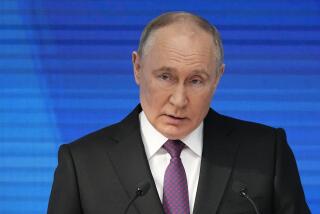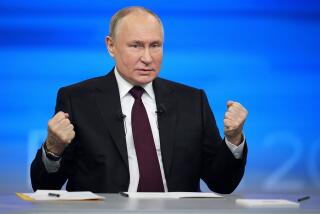Gorbachev Calls for ‘Gumption’ in Reform Push
MOSCOW — Soviet President Mikhail S. Gorbachev, in a televised New Year’s address Saturday, called on the Soviet people to stop sitting on the sidelines and to show greater “gumption” in pursuing his policy of economic reform.
Gorbachev acknowledged that perestroika , his program to restructure Soviet society, had raised high hopes among the citizens that had not yet been met. The 57-year-old Kremlin leader, who took office in March of 1985, blamed conservative forces in part for the slow pace of reform.
But, using tough language, he also said that every Soviet citizen should do more to improve the quality of consumer goods and to end the shortages that have typified Soviet life since the 1930s.
‘Greater Resoluteness’
“One cannot just outwit life and sit back on the sidelines,” Gorbachev said. “It is essential to act with greater resoluteness.”
He said his attempt to revamp Soviet society “lends wings to real champions . . . and gives them added energies and gumption. And this is just what we need now most of all.”
His remarks seem to respond to critics who complained bitterly to him during a trip to Siberia in September of long--and often unsuccessful--waits to obtain basic consumer goods.
Those dramatic encounters were carried on Soviet television, and Western analysts said the complaints helped to push Gorbachev to make major governmental changes in October, putting reform-minded supporters in positions of power.
Gorbachev’s year-end speech was broadcast across the country on Soviet television just minutes before midnight and was probably widely seen. New Year’s Eve in the Soviet Union is a family holiday that traditionally includes the exchange of gifts and the viewing of special television programs until early morning hours.
“I do not want, and have no right, to paint a rosy overall picture,” the Communist Party leader said in the broadcast. “ Perestroika gave rise to great expectations to society, but changes are not coming as fast as we would all like them to . . . . Demand still outstrips supply, especially when it comes to quality goods.
“This,” he added, “is explained in a large measure not only by the inertia of the past but also by the novelty of problems and the real difficulties of organizing life in a new way.”
Letters to officials have revealed Soviet concerns about how perestroika would affect individuals in the society where everyone is guaranteed a job and the state subsidizes everything from bread to apartments.
In his address, Gorbachev warned that perestroika would mean greater individual responsibility. He said the changes would include more reliance on “the pay-your-own-way system . . . and a broadened scope for initiatives and social enterprise.”
‘Have to Get in the Mood’
“We all have to get into the mood for such work,” he added.
On the topic of international relations, Gorbachev claimed that the Soviet Union, acting “in the spirit of the new political thinking,” was largely responsible for the thaw in the Cold War between East and West. The Soviets have learned to listen to the positions of other countries while still “abiding by our own principles,” he said.
“Of course, the shadows of the past are present in world politics,” the Soviet leader added. “But they are fading already. A new vision of the world is being established.”
On other subjects, Gorbachev referred briefly to the nationalist unrest that has torn parts of the Soviet Union. At least 31 people were killed in November in ethnic violence in the southwestern republics of Armenia and Azerbaijan.
“We are proceeding to another important phase of political reform, which will aim to harmonize inter-ethnic relations,” he said.
He also spoke of the Dec. 7 earthquake in Armenia, which the Soviet Union has said claimed tens of thousands of lives.
“The end of the year was darkened by anguish,” he said. “Our misfortune has evoked warmth, sympathy and response around the world.”
More to Read
Sign up for Essential California
The most important California stories and recommendations in your inbox every morning.
You may occasionally receive promotional content from the Los Angeles Times.









